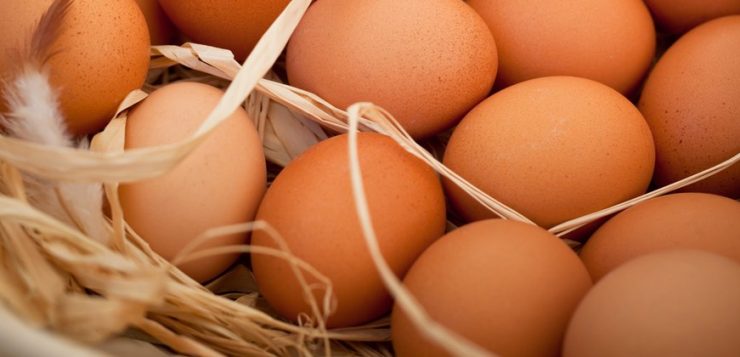
Eggs, cholesterol, and fat… there are a lot of misconceptions out there, so let’s review what the science tells us about eggs and cholesterol.
Through the years, the number of people suffering from hypercholesterolemia has been increasing, as a result, health authorities begun to advise decreasing eggs intakes, as they are a high-cholesterol food. However, there is nothing to fear about eggs, as we will see in this article.
Many studies have shown that cholesterol consumption is not correlated with cholesterol levels in the bloodstream. While there are several hypotheses as to why, the most probable one is the fact that the liver regulates the endogenous cholesterol production as a result of increased intakes of cholesterol.
What Are the Studies Telling Us?
- One study showed that the daily consumption of 3 eggs for subjects on a hypocaloric and hypoglucidic diet led to the increase of HDL cholesterol in the overweight group.
- In the major American study NHANES III, we learn that subjects who consumed 4 eggs a day had lower cholesterol levels than the group which only consumed 1 egg a day.
- A famous case was reported by a research group in 1991, one of a 88 year old man who, during 15 years, consumed an average of 25 eggs a day. The blood work showed not only average cholesterol levels, but also no sign whatsoever of any cardiac issues.
- Other studies tried to determine whether a link exists between yolk consumption and mortality rate. While results showed some variations, they nevertheless highlighted a high risk for diabetic people if consuming 2 eggs on daily basis. The risk, however, seems non-existent for healthy people who consumed 1 egg on a daily basis.
 Interestingly enough… all these studies have one common denominator: the eggs came from battery farming hens, who never saw daylight, which were mainly fed with GMOs. They cannot be compared with the nutrition of hens happily walking outside. The resulting eggs contain pale, whiteish yolks. Hens are thus often given extra coloring pigments in their diet, for the eggs to take on a more natural color.
Interestingly enough… all these studies have one common denominator: the eggs came from battery farming hens, who never saw daylight, which were mainly fed with GMOs. They cannot be compared with the nutrition of hens happily walking outside. The resulting eggs contain pale, whiteish yolks. Hens are thus often given extra coloring pigments in their diet, for the eggs to take on a more natural color.
Regarding their nutritive characteristics, it seems to me worth mentioning the fatty acid content of those eggs: high in omega-6, and low in omega-3.
That simply means each egg consumed increases the misbalance of essential fatty acids; in other words, this leads to a greater risk of cardiovascular diseases, cancers, mental diseases, or any inflammatory diseases (that is to say, a sh*tload of diseases).
On top of that, omega-6 consumption leads to an increase of inflammatory markers (interleukin-6), which are predicators of type 2 diabetes. I personally think this hypothesis is quite solid, and would explain the mortality rate that some studies pinpointed.
Cholesterol in The Fitness Industry
The relationship between muscles production and cholesterol has been established by studies which showed that after a resistance workout, blood cholesterol levels decrease for two hours, whereas an average of 3 days are needed to restore normal levels.
The fatigue that comes after resistance training, in the study, is also highly correlated to the decrease of cholesterol levels, and in greater proportion than the damages inflicted on muscle fibers. But, of course, tissues need cholesterol to heal…
Other studies went even further in order to underline the link between dietary cholesterol (again, via the consumption of eggs only) and muscle gains. The results speak for themselves:
- The higher the cholesterol intake, the higher the chances of muscle development and lean body mass.
- The higher the endogenous cholesterol production, the higher the chances for lean body mass.
This last conclusion seems even more legit: when LDL levels are high, HDL levels are low. And that makes sense, LDL are lipoproteins that transport cholesterol from the liver to the cells (so the muscles’ cells as well) whereas HDL transports cholesterol from the cells to the liver.
For those who are interested, we have a big piece here that thoroughly explains how lipids work. You can also visit the 11 Health Benefits of Eggs, According to Science (+12 Mouthwatering Egg Recipes), by Jen Reviews.
Sources
- Egg Consumption and Coronary Heart Disease and Stroke Mortality: A Prospective Study of US Adults, International Egg Comission (dead link).
- Egg Nutrition Center, NHANES Confirms—An Egg a Day is Okay. NutritionClose-Up, 2007, vol 24:1.
- F. Kern, Normal Plasma Cholesterol in a Man Who Eats 25 Eggs a Day. The New England Journal of Medicine,1991.
- Zambon A. et. al., Effects of hypocaloric dietary treatment enriched in oleic acid on LDL and HDL subclass distribution in mildly obese women. J Intern Med. 1999 Aug;246(2):191-201.
- ManyEats.com, The Health Effects of Eggs – More than Edible, Good for You!, 2020

